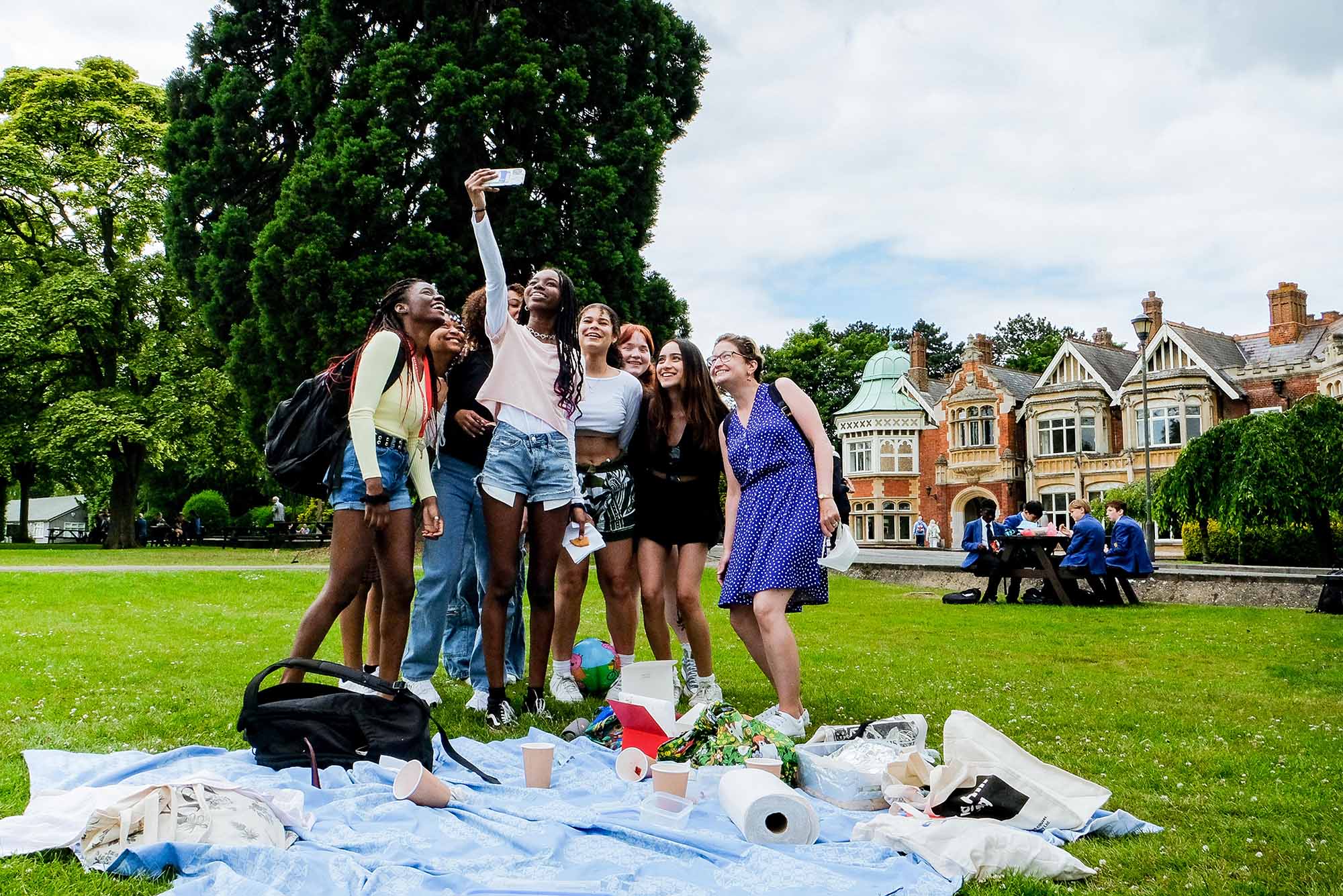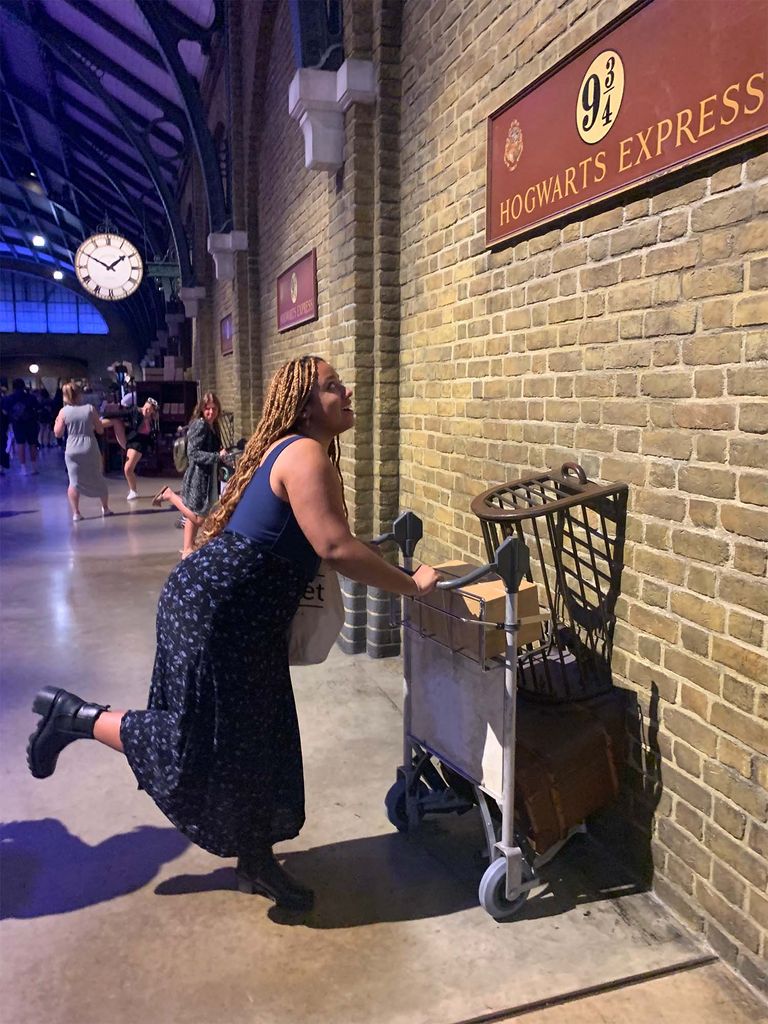CGS Freshmen Return to London This Summer after Two-Year Hiatus

The College of General Studies’ six-week London summer semester was back for the first time since 2019, and these students visited Bletchley Park, the principal center of Allied code-breaking during World War II. Photo by Ziyu (Julian) Zhu (CGS’23)
CGS Freshmen Return to London This Summer after Two-Year Hiatus
Over 600 students participated in the college’s Study Abroad program, combining coursework and UK field trips
College-age tourists in London may be likely to sign up for a formulaic Jack the Ripper tour, but BU College of General Studies freshmen enrolled in the past summer’s London program nixed the tales of blood and gore for a very different kind of walk.
The students in a rhetorical practices class toured London’s East End and then heard from historian Hallie Rubenhold. Rubenhold’s biography The Five examines the lives of the serial killer’s five female victims and rewrites the long-held narrative that they were prostitutes.
“It’s about women as objects, and how the Jack the Ripper case romanticizes the violence,” says Stephanie Byttebier (GRS’04,’13), a CGS senior lecturer in rhetoric, who led the class. “She told us how hard it was to write the book, and how she was trolled on social media and how that was life-altering.”
From British true crime to touring the Victoria & Albert Museum to seeing a play at the famed Shakespeare’s Globe Theatre, CGS freshmen got a six-week introduction to the history and culture of London and the United Kingdom this summer. The college enrolled 638 students in its London summer experience, which consisted of two separate sessions. (CGS students had the choice of enrolling in the college’s Boston–New England program if they wanted to stick closer to home.) COVID-19 had cut short or halted the London experience for two years; in May, 400 upperclassmen who had missed out on the program their freshman year attended a one-week abridged London experience.
“I think what the program offers students is an innovative and intensive experiential learning program,” says John Regan, a CGS master lecturer in rhetoric. “The same faculty taught the students in the spring, and so when we come over to London for our six-week accelerated courses, there is no downtime. From minute one we are working with the students and moving forward with ideas and work. You can make some real substantive connections between the two [semesters].”
CGS uses an interdisciplinary approach, with students in the London Experience program taking courses in rhetoric, social studies, and humanities, targeting pivot points in history. By way of example, Regan explains the different ways students in session II approached Shakespeare’s Julius Caesar.

Students enrolled in the social sciences course studied the tragedy from a historical point of view, Regan says, while students in the humanities course approached it from a literary lens and in the rhetoric class examined the different styles in the speeches of Brutus and Cassius. To further drive home the lessons, actor and educator Ben Crystal led an acting workshop for students before they saw the Globe Theatre performance of the play.
“One of the great moments of my career was watching the performance, and afterward walking to the Tube with the students,” Regan says. “They were commenting on how one actor chose to perform a speech, and they didn’t think another actor played the character of Marc Anthony seriously enough. These [are conversations] you could not have had with these students in January. It really is transformative.”
Other excursions included tours of Westminster Abbey (the final resting place of 30 kings and queens), Bletchley Park (the center of Allied code-breaking during World War II), and the seaside town of Brighton (which fortunately occurred during what was one of London’s record-setting heat waves). They also got a chance to see actor Emilia Clarke, best known for her role as Daenerys Targaryen in Game of Thrones, make her London stage debut in a West End production of Anton Chekhov’s The Seagull, took a trip to Edinburgh, and went on the Harry Potter Studio Tour.
But the London program students also explored some of England’s history of imperialism and colonialism, and various pressing contemporary issues facing the city. Byttebier says her rhetoric class studied how the emergence of photography in the 19th century transformed the way the public saw human suffering.
Her class also visited Brighton’s picturesque Royal Pavillion, originally George IV’s “pleasure palace,” which was used as a World War I–era military hospital for Indian soldiers who fought for the British army. They visited a gallery displaying propaganda photos of the soldiers taken by the British. “We talked about the Indian soldiers being mistreated after the war, since they weren’t granted the independence they were promised,” Byttebier says. “The students were so upset about this [injustice], and this was the most passionate conversation we’ve had all year.”
Natalie Dudych (CGS’23) says her time abroad was a lesson in adaptability, as she had never traveled on her own before. “At first, the thought of being so far from home was frightening—I questioned myself and whether or not I could actually spend the six weeks in London and have a good semester,” she says. “But the moment I made it to my London dorm, I stopped questioning myself. I had a wonderful semester, and I saw and experienced so much of London that with each passing week I felt less and less like a foreigner.”
Classmate Sara Diaz (CGS’23) says the program challenged her to question everything she was experiencing while abroad. “America and the UK parallel each other in a lot of ways, and being there allows you to think about their places in Western society,” Diaz says. “You are also growing by meeting new people and getting to know more about the same people from your spring semester. I can honestly say that I have grown and changed in many ways throughout my six weeks.”
Comments & Discussion
Boston University moderates comments to facilitate an informed, substantive, civil conversation. Abusive, profane, self-promotional, misleading, incoherent or off-topic comments will be rejected. Moderators are staffed during regular business hours (EST) and can only accept comments written in English. Statistics or facts must include a citation or a link to the citation.